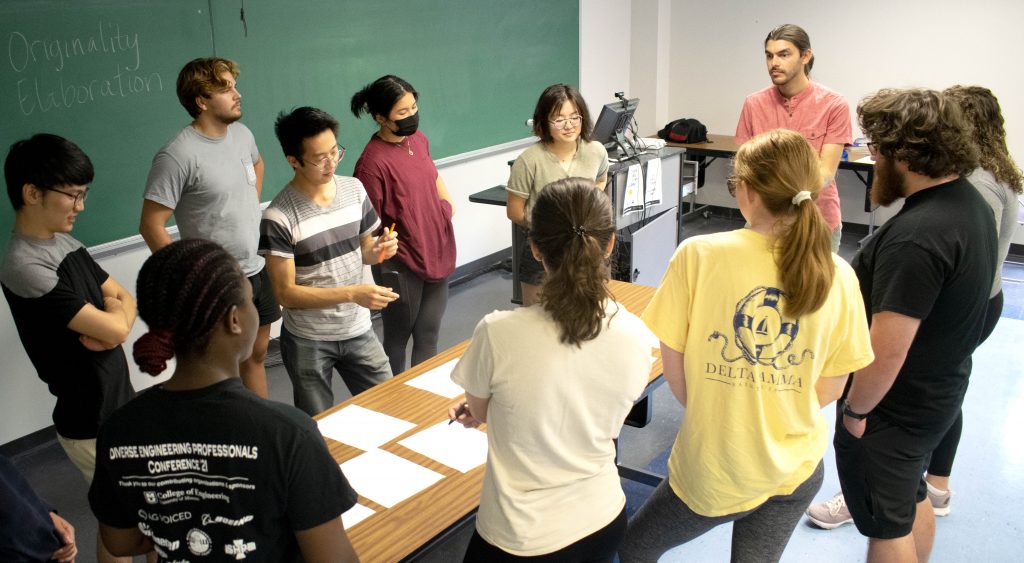July 29, 2021

Students participating in a National Science Foundation Research Experiences for Undergraduates (REU) program at Mizzou Engineering got more than a material science and engineering education this summer. They also learned how to incorporate creativity into their research.
This is the third year for the REU: Creative Approaches to Materials Design and Processing led by Heather Hunt, associate professor of biomedical, biological and chemical engineering (BBCE). Undergraduate students studying STEM disciplines come to Mizzou from across the country to conduct research around material science and engineering.
Students also participated in creativity seminars, this year led by Josh Saboorizadeh, a PhD student in the theatre department. Similar to a Creativity Academy BBCE faculty participated in last month, the students went through activities and discussions to activate their imaginations.
Megan Harrington, Carmen Shum and Obaro Emeje all say they are creative outside of class. They paint, draw, write and do yoga. Until this summer, though, they agreed they hadn’t considered applying that creativity to their schoolwork or their discipline.
“When it came to engineering, I never thought to be creative because in class you stay within the parameters you’re given,” said Shum, who is a senior studying biomedical engineering at Stoney Brook University in New York.
The creativity seminar aims to break that barrier and demonstrate how engineers can think beyond formulas and be more innovative.
“It seems a lot of students compartmentalize creativity however they choose to define that,” Saboorizadeh said. “But they don’t realize that creativity work has a place in engineering and in the classroom. They don’t need to be compartmentalized; they can occur together.”
During the seminar, participants completed out-of-the-box activities such as coming up with 40 ways to cross a room. In addition to walking, students exercised, danced and walked on their hands to complete the task.
“The activities were really helpful understanding there are so many different approaches you can take to a problem,” Shum said.
Harrington, a chemical engineering major at the University of Tulsa, agreed, saying the activities gave her an appreciation for seeing situations in a new light.
“For me, the creativity seminar was a way to introduce new tools I can use,” she said. “I can embed creative practices in routine things I do in engineering — the way I tackle a problem in a group or communicate my perception of a problem. Reframing questions is something I’ll take with me when I go back to school in the fall.”
Emeje was one of two Mizzou Engineering students who took part in the creativity seminars outside of the REU. She admitted participating took her out of her comfort zone, but now feels better prepared to be more open to new experiences in the future.
“I normally don’t do something if I don’t feel comfortable,” she said. “Now I’m going to take more risks and do things I normally wouldn’t.”
Harrington and Shum also said the experience equipped them with confidence.
“I’m going to be more confident sharing my ideas and articulating what I’m saying,” Harrington said. “Everyone should feel free to do that.”
“Sometimes you restrict yourself in saying something,” Shum added. “Here, all ideas were welcome, even ideas that seem completely out there.”
All three students said they plan to think about creativity now when working on class or research projects. Additionally, they hope to use some of the activities they participated in within their own clubs and organizations.
Emeje is the membership chair of the National Society of Black Engineers at Mizzou and plans to implement some of the creativity ideas into events.
“Hopefully it will get more freshmen to join and have a great experience,” she said.